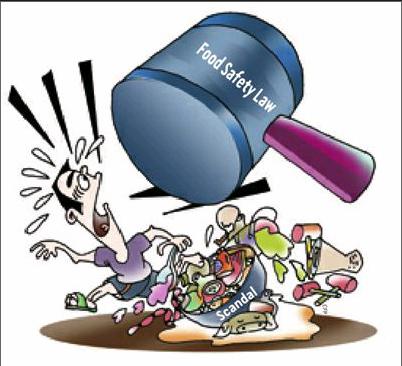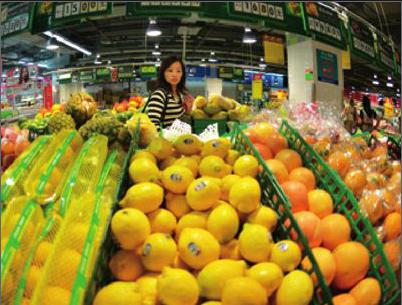Taking a Bite Out of Crime
2014-07-28ByYuanYuan
By+Yuan+Yuan


With frequent food scandals including heavy-metalladen rice, contaminated milk powder, vegetables with excessive pesticides and toxic chemical additives injected into food, anxiety about what you are putting into your body can sometimes dampen the enjoyment of even the finest food in China.
The issue forms something of a difficult situation for a country renowned for its rich culinary traditions, though a food-loving country such as China could never give up its high standards for dishes of the finest quality.
In its latest bid, China is turning to harsher legal punishments to help bring improvements.
During its bi-monthly session last month, the Standing Committee of the National Peoples Congress (NPC), Chinas top legislature, held its first reading of an amendment to the Food Safety Law. Generally, the enactment of a law or law amendment in China will go through at least three readings in the NPC or its Standing Committee, during which changes are made in response to feedback of lawmakers and the public.
A step forward
China started to phase in a legal framework for food safety issues in the early 1980s. In 1982, the experimental Food Hygiene Law was promulgated and paved the way for the present Food Safety Law.
At that time, the main concerns for food safety focused on food that was rotten, unsanitary or otherwise capable of causing poisoning, as well as food processing that introduced contaminants.
In 1995, the Food Hygiene Law was enacted and its scope expanded to other safety issues, such as food made with illegal chemical additives, as well as specific standards for food in hospitals and for infants.
In 2009, after three years of drafting, the Food Safety Law took effect. It consolidated hundreds of disparate regulations and standards in China into one unified food safety standard with the purpose of “establishing a powerful and effective legal system and increasing consumer confidence as well as pushing the development of the food industry while maintaining higher standards of quality.”
But the situation has become worse in recent years. Weak penalties and slack regulation are cited as reasons for ineffective implementation of the law.
“The penalties for offenders are minor and the enforcement of the law is too lax, making the price of offending the law not high enough to stop breaches of the law,” said Wu Jingming, a professor at China University of Political Science and Law in Beijing. “For consumers, the process of safeguarding their legal rights is time-consuming and few want to take the matter to court considering the little they get even if they win. More detailed regulations are needed to refer serious offenders to the criminal justice system.”endprint
Meanwhile, a number of shocking practices, including injecting clenbuterol into pork, recycling cooking oil, selling pork from sick pigs, making medicine capsules with toxic gelatin and passing rat and fox meat off as mutton and beef have made headlines in recent years. According to the Ministry of Public Security, police have investigated more than 52,000 food safety cases in the past three years.
Such instances have made the amendment of the Food Safety Law urgent. In late October 2013, the China Food and Drug Administration (CFDA) published a draft version of the latest amendment for public comment.
That draft increases the number of articles by 50 percent. It indicates that food manufacturers and distributors can expect stronger regulation of their internal operations and supply chains, and that local governments can expect that the Central Government will be more closely monitoring the way they enforce the law. Calls for companies and local governments to play more active, even aggressive, roles in solving food safety problems in China have been mounting for several years now.
The price for breaking the law will be much higher, according to the amendment.
Producers can face fines of up to 30 times the value of their products, up from 10 times under the current law. If the products are worth less than 10,000 yuan ($1,609), those involved can be fined a maximum of 150,000 yuan ($24,135), up from 50,000 yuan ($8,045) currently.
Meanwhile, consumers can demand reparation worth up to three times of losses they suffer from substandard food. This means that medical expenses incurred at the hands of unsafe food could potentially be paid back to victims threefold. The current law only allows compensation up to 10 times of the foods price at time of purchase.
The bill also adds provisions to punish the landlords of production sites who know that illegal activities are being undertaken on their property, and suppliers who sell unlawful substances to producers, knowing that they will be added to foods. Any illegal income gained in this way will be seized alongside fines up to 200,000 yuan ($32,180).
The draft amendment also proposes that a unified supervision and management system is formed to encompass state- and local-level food and drug administration systems across the country.
Administrative penalties, such as demotion and dismissal, will be imposed on officials who fail to respond to food safety emergencies and remove loopholes. They will also be held responsible for food safety cover-ups. Similar punishments will be dished out to officials with food and drug regulatory agencies, health and agriculture departments.endprint
Employees engaged in testing services who present false reports that result in major food safety incidents, or engaged in related crimes, will face lifetime bans from such work.
“The amendment will impose harsh civil, administrative and criminal penalties on offenders and tough punishments for supervisors who neglect their duties,” Xinhua News Agency quoted Zhang Yong, head of CFDA.
Opinions
“The amendment has a well-established framework. It responds to the general publics expectation to get tough on crimes concerning food safety,” said Cai Fang, a member of the NPC Standing Committee, at a panel discussion on the bill on June 23.
With a dairy firm and frozen food plant in central Chinas Henan Province, NPC deputy Zhang Haiqing supported the bill.
“The current law does not have very clear provisions on what kind of offenses should be considered breaking the law. This leaves room for some offenders to talk their way out,” said Zhang Haiqing. “By punishing those who break the law, those who abide by it will no doubt benefit as the reputation of the industry and public confidence will improve.”
Chen Weiwen, also a member of the NPC Standing Committee, suggests that the law should move further from the production of food to the growth of its ingredients.
“For instance, many dietary supplements use ingredients from medical herbs. The species of the herbs and the environment these herbs grow in will greatly influence the quality and safety of dietary supplements,” Chen said.
“The amendment will add teeth to food safety watchdogs but its implementation will not be simple given the rampant tacit consent and agreements within and beyond food producers,” said Zheng Fengtian, a professor at Beijing-based Renmin University of China. “Unsafe food producers could potentially work out ways to evade the harsher penalties.”
Liu Junhai, Director of the Business Law Center of Renmin University of China who helped draft the amendment, calls on concerned departments to work together and coordinate their supervision of food safety.
“The compensation for the victims of food safety incidents shouldnt have a maximum limit,” Liu added. “Even 30 times of the product value is not that much in some cases and it can be higher depending on specific cases.”endprint
